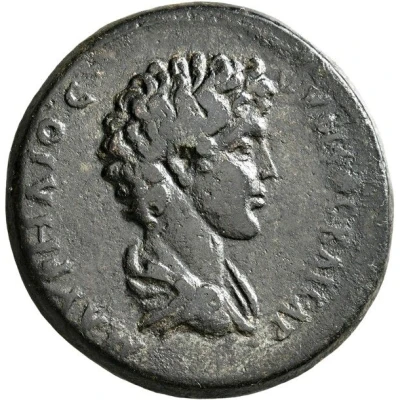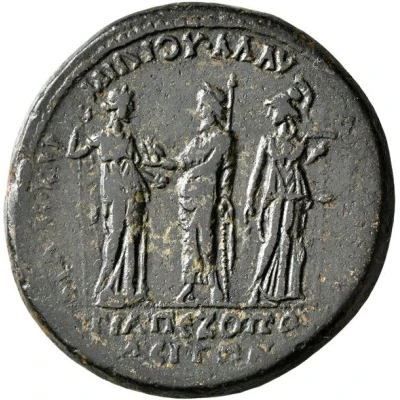


Tetrassarion - Commodus ΔΙΑ M ΚΑΡΜΙΝΙΟY ΚΛΑYΔIANOY - ΤΡΑΠЄΖΟΠΟ ΛЄITΩN
| Bronze | 15.87 g | 30 mm |
| Issuer | Trapezopolis (Conventus of Alabanda) |
|---|---|
| Emperor | Marcus Aurelius (Marcus Aurelius Antoninus) (161-180) |
| Type | Standard circulation coin |
| Years | 166-169 |
| Value | Tetrassarion (0.4) |
| Currency | Drachm |
| Composition | Bronze |
| Weight | 15.87 g |
| Diameter | 30 mm |
| Shape | Round (irregular) |
| Technique | Hammered |
| Orientation | Medal alignment ↑↑ |
| Demonetized | Yes |
| Updated | 2024-10-10 |
| Numista | N#406825 |
|---|---|
| Rarity index | 100% |
Reverse
Zeus Laodiceus standing front, head to left, holding eagle in his right hand and scepter in his left, between Hera, on the left, standing front, head to right, holding scepter in her right hand and pomegranate in her left, and Athena, on the right, standing front, head to left, holding olive branch in her right hand and shield and spear in her left.
Script: Greek
Lettering: ΔΙΑ•M•ΚΑΡΜΙΝΙΟY•ΚΛΑYΔ[IANOY] - ΤΡΑΠЄΖΟΠΟ/ΛЄITΩN
Comment
Unpublished and unique. A very interesting issue with a lovely juvenile portrait.
Magistrate of M. Oul. Karminios Klaudianos (asiarch)
The asiarch M. Oul. Karminios Klaudianos also signed coins from Attuda in Caria showing Marcus Aurelius and Lucius Verus on the obverse (RPC IV online 856), which dates our coin to between 166, when Commodus was raised to the rank of Caesar at the age of five years, and 169, when Lucius Verus unexpectedly died. This is thus one of the earliest of all provincial issues of Commodus, and hitherto his only known coin from Trapezopolis as Caesar.
Interesting fact
One interesting fact about this coin is that it features a rare combination of Greek and Roman elements. The obverse (front) side of the coin bears the image of the Roman emperor Commodus, while the reverse (back) side features the Greek goddess Aphrodite. This blending of cultural influences reflects the multicultural nature of the Roman Empire during the 2nd century AD, when Greek and Roman deities were often worshipped together.